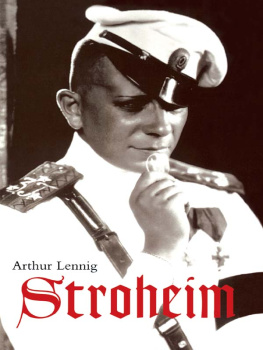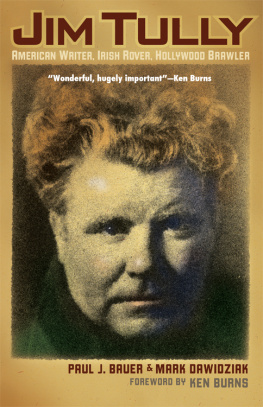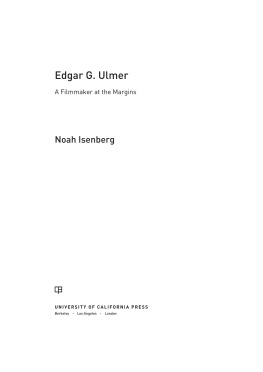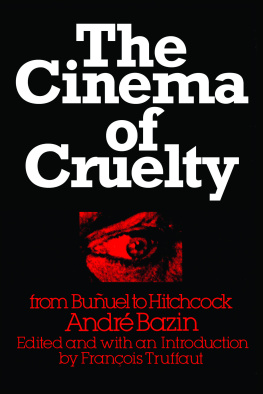Lennig - Stroheim
Here you can read online Lennig - Stroheim full text of the book (entire story) in english for free. Download pdf and epub, get meaning, cover and reviews about this ebook. City: Lexington;Ky, year: 2007;2011, publisher: The University Press of Kentucky, genre: Non-fiction. Description of the work, (preface) as well as reviews are available. Best literature library LitArk.com created for fans of good reading and offers a wide selection of genres:
Romance novel
Science fiction
Adventure
Detective
Science
History
Home and family
Prose
Art
Politics
Computer
Non-fiction
Religion
Business
Children
Humor
Choose a favorite category and find really read worthwhile books. Enjoy immersion in the world of imagination, feel the emotions of the characters or learn something new for yourself, make an fascinating discovery.
- Book:Stroheim
- Author:
- Publisher:The University Press of Kentucky
- Genre:
- Year:2007;2011
- City:Lexington;Ky
- Rating:4 / 5
- Favourites:Add to favourites
- Your mark:
- 80
- 1
- 2
- 3
- 4
- 5
Stroheim: summary, description and annotation
We offer to read an annotation, description, summary or preface (depends on what the author of the book "Stroheim" wrote himself). If you haven't found the necessary information about the book — write in the comments, we will try to find it.
Stroheim — read online for free the complete book (whole text) full work
Below is the text of the book, divided by pages. System saving the place of the last page read, allows you to conveniently read the book "Stroheim" online for free, without having to search again every time where you left off. Put a bookmark, and you can go to the page where you finished reading at any time.
Font size:
Interval:
Bookmark:
Stroheim
Arthur Lennig
T HE U NIVERSITY P RESS OF K ENTUCKY
Copyright 2000 by Arthur Lennig
Published by The University Press of Kentucky
Scholarly publisher for the Commonwealth,
serving Bellarmine University, Berea College, Centre
College of Kentucky, Eastern Kentucky University,
The Filson Historical Society, Georgetown College,
Kentucky Historical Society, Kentucky State University,
Morehead State University, Murray State University,
Northern Kentucky University, Transylvania University,
University of Kentucky, University of Louisville,
and Western Kentucky University.
All rights reserved.
Editorial and Sales Offices: The University Press of Kentucky
663 South Limestone Street, Lexington, Kentucky 40508-4008
07 06 05 04 03 5 4 3 2 1
Library of Congress Cataloging-in-Publication Data
Lennig, Arthur.
Stroheim / Arthur Lennig.
p. cm.
Filmography: p.
Includes bibliographical references and index.
ISBN 0-8131-9044-4 (pbk.: alk. paper)
1. Von Stroheim, Erich, 1885-1957. 2 Motion picture producers and directorsUnited States Biography. I. Title.
PN1998.3. V67L46 1999
791.430233092-dc21 99-27365
[B]
This book is printed on acid-free recycled paper meeting the requirements of the American National Standard for Permanence of Paper for Printed Library Materials.

Manufactured in the United States of America
This book deals with a complex man, a great man, and certainly a tragic man. It deals with someone who held his artistic mission higher than worldly success, who felt that the integrity of his vision and his undoubted sincerity and even genius would somehow triumph over the money-grubbers of Hollywood and the beclouded millions who filled the theaters.
He was wrong. His mighty film, his full evenings offering, would not be. Never would he share that vision. What had been so painstakingly wrought would be shattered again and again, as if by some malicious demon. Not only would his visions be smashed. That urge to direct, to put upon the screen what this meticulous and unwavering man saw, would be thwarted. The last years of his life would be spent in creative impotence, acting in films directed by men without one shred of his talent and often doomed to portraying little more than caricatures of himself.
Does greatness breed tragedy? Can only the mediocre succeed? Certainly in the history of film its most gifted artists have suffered. Griffith, Stroheim, Eisenstein, Gance, Dreyer, von Sternberg, Pudovkin, and Welles were all curbed or stopped when they yet had a great deal to offer. Movies demand money and without it even the greatest talent can do nothing. The moral to this is not an encouraging one.
But we are not dealing with morals. Ostensibly, there was no greater realist than Erich von Stroheim, yet how unrealistic he was! He was a cynic, they say, a depicter of mans worst motives and often the perverse symbol of them in his own screen persona. Yet we have here, in his own strange way, an idealist beyond all belief, a man who when he got near cameras could not let go until he told all, got every detail precisely right. And he was correct. Time has vindicated him: now we read about this man, and film companies rent out his works, while other talents and films of his periodonce so highly regarded by executives, exhibitors, and audienceslie moldering in neglect.
But time erodes all. Except for students of film, Stroheim has faded into the past. Perhaps a few remember a commandant in La Grande Illusion or a sour-faced old man with an accent in Sunset Boulevard.
Stroheim speaks in La Grande Illusion about the sole flower in the fortress. He is not the sole flower in the barren prison of the American cinema, but he is in a select garden. He is not the rose unfurling and dropping its petals, which perhaps would represent Griffith, but the cactus that from its spiny case emits a flower of intricate design and incomprehensible radiance.
This examination of the life and career of Erich von Stroheim stems from a number of personal factors. During my grade school days, I was drawn to the work of two actors, John Barrymore and Bela Lugosi. Soon, they were joined by Erich von Stroheim, whom I first encountered in The Lady and the Monster and, shortly after, in The Great Flamarion. Each of these three men had an overwhelming screen presence that radiated intelligence, personality, and panachethey were flamboyant characters with ironic twists. To me, as a young boy, they were extraordinarily fascinating.
In those days, I also became intrigued by silent films, Chaplins reissue of The Gold Rush probably being the impetus, followed soon by C.B. DeMilles King of Kings. Their silence was intriguing. I never missed the rare occasions when such golden oldies were shown. In them I found beauty and charm. For reasons I cannot quite explain, I became nostalgic about a time long before I was born. This looking backward was reinforced by my intense interest in pre-1925 recordings, which led me to Enrico Caruso and eventually to opera.
By the time I reached the eighth grade, I was attending the Metropolitan Opera, corresponding with Bela Lugosihe later visited me at my homeand trying to learn as much as I could about the art of the cinema, which, in those days, was considered almost a joke. I was most impressed by Lewis Jacobss The Rise of the American Film, Paul Rothas The Film till Now, and, a few years afterward, Peter Nobles Hollywood Scapegoat, the first biography of Stroheim. Later, I was entranced by Sunset Boulevard, for it combined silent film, nostalgia, and Stroheim all in one bravura production. When Gloria Swanson appeared in the play Twentieth Century on Broadway, I went backstage and interviewed her for well over an hour. As a teenager, I got in. Twenty years later, as a professor, I was refused an audience by her assistant!
I also began shooting 16 mm films, which made me more aware of lenses, composition, camera placement, and, of course, editing. Hollywood, however, seemed an impossibility in those days to an idealistic youth devoted to The Cinema. So when I went to college I majored in English. I consoled myself as an undergraduate by running a film society, which showed mostly silent films, and writing program notes.
In the late 1950s, while working on a doctorate in English and American literature at the University of Wisconsin at Madison, I joined the Wisconsin Film Society, which showed classics and provided informative notes for its members. My main interest then was in the German and Soviet silent cinema. At the time, film was seen as a foolish preoccupation, looked down upon by my fellow doctoral candidates and most of my professors. Writing about film was even worse. Despite such derision, I became the film societys president and persuaded fellow students to write articles, which were printed in 1960 in a book called Film Notes.
The society indulged my curiosity about Stroheim by booking the only films then available on 16 mm, Blind Husbands, Foolish Wives, and Greed. In my program notes, I discussed the Stroheim persona and identified at least some of his obsessions. These notes were later reworked and published in Classics of the Film (1965), a volume that also included the first serious examination of Bela Lugosis career.
After receiving my Ph. D. in 1961 (my thesis was on Ezra Pounds Cantos), I traveled in Europe for a year, visiting film archives and attending many screenings at the Cinmathque Franaise. There I met Lotte Eisner, Jean Renoir, and Henri Langlois. I also screened films in Rome and visited the UFA studios near Berlin.
Font size:
Interval:
Bookmark:
Similar books «Stroheim»
Look at similar books to Stroheim. We have selected literature similar in name and meaning in the hope of providing readers with more options to find new, interesting, not yet read works.
Discussion, reviews of the book Stroheim and just readers' own opinions. Leave your comments, write what you think about the work, its meaning or the main characters. Specify what exactly you liked and what you didn't like, and why you think so.






